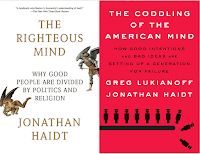
The WEIRDest People in the World: How the West Became Psychologically Peculiar and Particularly Prosperous by Joseph Henrich
My rating: 5 of 5 stars
Ten years ago, the author of this book, Joseph Henrich, wrote a journal article with the same title as this book. In that article, they coined the acronym WEIRD, which stands for Western, Educated, Industrialized, Rich, and Democratic. The term WEIRD has become a staple in psychological research as most psychological research has been conducted in WEIRD cultures, but a growing number of scientists are questioning whether the results from WEIRD cultures can tell us about inherent human tendencies or whether the results apply to other non-WEIRD cultures.
This book makes a convincing case that WEIRD cultures are weird cultures that they stray from the norm in several ways and because of that, WEIRD psychology should typically be considered the exception to the rule, not the standard or norm. Henrich chronicles how WEIRD morality, thinking style, family structure, and other factors differ from non-WEIRD or less WEIRD cultures throughout the rest of the world and throughout history. He also traces the development of WEIRD culture throughout history, and unexpectedly, he argues that the development of WEIRD cultures is largely, but not entirely, the result of the Christian church.
Throughout the book, he refers to the church’s marriage and family plan, which he dubs the church’s MFP. Monogamy is perhaps the major factor of the MFP that changed culture because polygamy, he argues, is the norm but polygamy creates inherent societal and personal issues that prevent critical thinking, individualism, universal morality. He also cites the effect of the reformation and the protestant emphasis on reading and writing so that everyone could read the Bible for themselves, as a major factor leading to WEIRD societies. He goes through several other factors, not all of which come back to the church, such as the practice of young men living with and doing apprenticeships with other families, that have led to the development of WEIRD cultures.
Several times in the book, Henrich makes that statement that the positive resulting from the church are not because the church was promoting divine truth, but because the church just happened to stumble on a beneficial way of thinking and acting, and because they were stubbornly dedicated to spreading their worldview, they succeeded. This is not surprising to hear because Henrich is not a Christian, and as far as I can tell, he’s an atheist. However, this explanation is limited for precisely the reasons why he wrote this whole book, the Judeo-Christian worldview (although more emphasis on the Christian part) is weird. If this is correct, as Henrich argues, then it doesn’t make sense that it would develop in the first place apart from divine revelation.
This may not be the strongest or most absolute argument for the truth of Christianity, but I think it’s definitely a better explanation than to say that the Christian worldview and moral system developed by chance, and opposition to every other worldview that surrounded it, by some random powerless people that gained no benefit from the system they were espousing. Henrich makes a good case for how some aspects may have developed naturally as the church grew in size and power, but he cannot account for where it all came from in the first place, especially when considering the historical details of how Christianity started and the cultural background Judaism came out of.
Regardless of whether the effect of the church in developing Western culture works as an argument for the truth of Christianity, the book makes a pretty strong case that Western views of rights and fairness are the result of the church and can’t really be justified without presupposing the Christian worldview.
Ultimately, this book was extremely fascinating and I highly recommend it to anyone; however, it will be of particular interest to anyone interested in psychology (or other social sciences) and for Christians (particularly apologists). For psychologists, Henrich makes a good case for more cross-cultural research. While this is a popular level book, Henrich is a legitimate scientist and his conclusions are well-supported by peer-reviewed research. For non-psychologists, the book is not overly technical or difficult to follow, and it’s actually quite enjoyable to read (or listen to) so that it never felt like I was slugging through some boring non-fiction book.
View all my reviews



